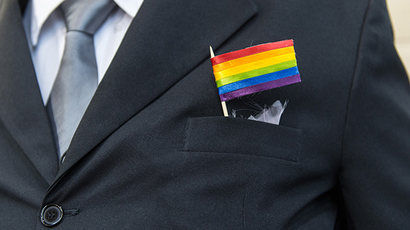Furor over Kansas bill allowing denial of essential services to same-sex couples
A bill legalizing discrimination of gay couples being considered by the Kansas House of Representatives has triggered a wave of outrage across the US by gay rights supporters.
After the strong reaction, the Senate was planning to dump the law which would have allowed people to openly deny services, care or employment to same-sex couples if “it would be contrary to their sincere religious beliefs.”
Some say it would be more threatening than outlawing gay marriage altogether, as the services include essential medical care, and state hospitals could potentially deny to provide treatment for gay couples.
Another example is that if a gay couple calls the police, officers may also refuse to help them on the basis of their religious beliefs.
RT’s Gayane Chichakyan asked residents of Washington, DC, one of the most gay-friendly cities in the US, what they think of the new potential legislation.
Most people are against the law, calling it a “really terrible” move and “a fundamental contradiction of separation of church and state.”
However, one of the residents disagreed with the majority.
“I don’t think that the state should be able to force people to do things that go against their religious beliefs."

RT spoke to gay rights activist Sarah Meade, who said that gays see discrimination on the daily basis already due to flawed legislation.
“In Kansas, we have no anti-discrimination statute which includes sexual orientation or gender identity. Even if the Supreme Court were to declare that the Kansas anti-discrimination bans are unconstitutional, residents of Kansas could still go right ahead and discriminate as they do today. So this is kind of a smoke-screen that a lot of people are throwing up that this is really about cakes and wedding pictures,” Meade says.
Kansas is not the only state to attempt implementing laws of the kind: it’s followed by Idaho, Mississippi, Ohio, Oklahoma, and Oregon.














